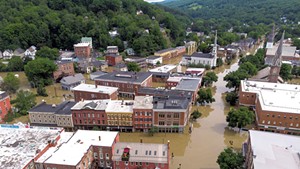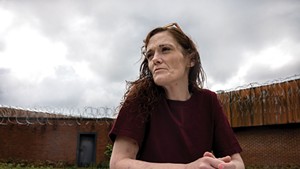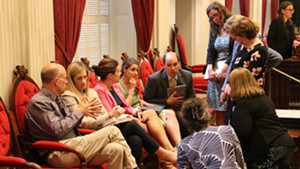
- © Francesco Scatena | Dreamstime
When Vermont lawmakers return to the Statehouse next month, they'll face a growing list of intractable problems — rising crime, more frequent floods and an acute housing shortage — with less cash to tackle them.
Federal pandemic dollars have dried up, leading to an anticipated 5.5 percent drop in the state general fund — the first decline in more than a decade. The $2.1 billion in expected revenues would still exceed pre-pandemic levels, so budget drafters shouldn't be hard up for cash. But lawmakers will have to tighten their belts at a time when the needs of the state are growing.
"Producing a balanced budget may be a challenge this year," deputy fiscal officer Emily Byrne told lawmakers earlier this month.
Legislative leaders are nevertheless encouraging members to swing away at big issues this session, aware that challenges such as homelessness and opioid addiction are ravaging communities, generating disturbing headlines and rattling voters' confidence.
"While there is a lot to celebrate, there is a tremendous amount of work ahead to make Vermont a healthier and safer state," House Speaker Jill Krowinski (D-Burlington) told fellow Democrats during their annual presession caucus in early December.
Substantial, costly proposals such as universal paid family leave, long sought by Democrats, could be casualties. Krowinski said she plans to keep advocating for the policy, despite a voluntary alternative the governor has launched. But Senate President Pro Tempore Phil Baruth (D/P-Chittenden-Central) said he doesn't see it going anywhere in the coming year.
"We just don't have the votes, the resources or the bandwidth for that," Baruth said.
What will they take up when the session starts in January? Seven Days talked to lawmakers about Vermont's big issues. Here are seven they are likely to prioritize.
— K.M.
After the Floods
Lawmakers will be reminded of the summer's catastrophic flooding every time they walk past the remaining empty storefronts in hard-hit Montpelier. Several proposals for strengthening Vermont's flood resilience are expected to get attention in January.
"What really worries me is the next flood," said Rep. Marc Mihaly (D-Calais), whose community sustained heavy damage.
One area of concern: dams. A brigade of community members in Calais used cinder blocks and tarps to prevent Curtis Pond Dam from failing. At the height of the flooding, the waters nearly topped the almost 100-year-old Wrightsville Dam, which would have inundated the already-soaked state capital.
Mihaly will propose better dam regulation. Today, a patchwork of entities oversees Vermont's 1,200 dams. He wants to strengthen the Dam Safety Program within the Department of Environmental Conservation and have it regulate all dams.
"They're good," Mihaly said of the DEC staffers. "But they don't have enough engineers."
Mihaly said it's not clear whether all of Vermont's dams can handle the heavy rainstorms, such as this week's, that have become more common. About 10 miles east of Calais is the earthen No. 6 Marshfield dam, which holds back a 400-acre reservoir. Built in 1927, the dam is part of a hydroelectric facility owned by Green Mountain Power.
"If they had to open the floodgates or, God forbid, that earthen dam was overtopped, Marshfield village would be underwater in two or three minutes," Mihaly said. "Plainfield would be underwater in less than an hour; those villages would be destroyed. And flooding would be pretty bad in Montpelier."
The flooding in the Capital City was bad enough, even though the dams held. Then, much of the recovery work was left to business owners and volunteers who cleared storm debris downtown, Rep. Conor Casey (D-Montpelier) said. He thinks the state needs to provide more cash for cleanup and have better protocols for responding to extreme events. He plans to introduce legislation to that effect.
"What was happening on the ground was nothing short of chaos," Casey said. "The state was fairly absent. There were press conferences, but that's no good when you have no power in town. Let's get some systems in place."
Casey also wants to pass a bill that would require landlords to divulge a home's flood history to prospective tenants. "People need to know what they're getting into when they move into some of these communities," he said.
— A.W.A.
Laying a Foundation
A law approved earlier this year known as Act 47 requires cities and towns to revise zoning regulations to make it easier to build housing. This winter, lawmakers will continue to make housing a priority with yet another push to change Act 250, Vermont's land-use law.
Housing remains in critically short supply despite years of state investment and work to encourage development, particularly for low- and middle-income Vermonters. Housing advocates have long said Act 250 needs to be updated to allow more development, but they've been unable to reach agreement with environmental groups that want to preserve its protections.
Rep. Seth Bongartz (D-Manchester) said he's been working for months on a wide-ranging housing bill — that includes changes to Act 250 — with Rep. Amy Sheldon (D-Middlebury), chair of the House Committee on Environment and Energy and a longtime ally of environmental advocates. The next round of housing proposals, Bongartz said, will reflect that collaboration. "It's about making it easier to get housing built in the right places, under the right circumstances," he said.
The right places include areas with water and sewer infrastructure, such as village centers. In the wake of this year's devastating rainfall, flood risk — which is greater in village centers along rivers — will play a central role in the discussion, too. But that doesn't mean dropping the push for downtown development, Bongartz said.
"We can't abandon our downtowns," he said. "We have to think more comprehensively than that. In some cases, that will mean building buildings that are flood-proof."
Four far-ranging studies due to the legislature before the session should inform the housing conversation.
Ted Brady, the executive director of the Vermont League of Cities & Towns, said municipalities have been working overtime this year to change their zoning bylaws to comply with Act 47. Now, he said, the focus should move to state regulations. "The legislature passed the buck on state responsibility and put it on the municipalities last year," Brady said. "I hope those four studies are zeroing in on recommendations for what to change at the state level."
— A.W.A.
Mass Evictions?
The state has a more immediate problem that stems from the housing crisis: rising homelessness. The problem has been all too evident in places such as Burlington, where people have pitched tents in parks and along busy roads. With the pandemic in the rearview, related programs to prevent evictions and shore up housing are disappearing, which will likely worsen matters.
Case in point: A scaled-down version of the pandemic-era program that housed homeless people in motels at the state's expense is still operating but will shut down on April 1.
Last session, a large contingent of lawmakers and Gov. Scott sought to end the program, which they said was not sustainable without federal pandemic dollars. But a group of progressive lawmakers balked at the plan and even threatened to hold up the state budget until the pending evictions were halted.
In the end, about 760 able-bodied people were kicked to the curb, while about 1,300 people considered more vulnerable — the elderly, disabled folks and families with children — were allowed to stay through the winter.
Since July, state social workers have helped about 200 of those people find other housing. But as the state increasingly relies on the motel program for its original purpose — housing people during the coldest months — the number of these motel residents is expected to swell to 1,500 this winter, at a cost of $50 million.
The Scott administration is looking to open several new emergency shelters to address the need, but it's not clear they'll be ready by April 1. And advocates argue that such spaces are not a long-term solution; they're calling for additional permanent, affordable housing development. Lawmakers will be under pressure to act, and quickly.
— K.M.
Justice Delayed
Lawmakers say they have a plan to crack down on rising crime by ensuring defendants face the consequences more quickly.
A deep court backlog, judicial vacancies and a budget crunch all contribute to long delays between the time when people are charged with crimes and when their cases are resolved, said Rep. Martin LaLonde (D-South Burlington), who chairs the House Judiciary Committee.
Some people are released back into the community while their case is pending only to reoffend, LaLonde said. Law enforcement and community leaders have expressed concern that this is a particular problem with shoplifters. One potential remedy could be to consolidate misdemeanor retail theft charges as a felony if the total value of stolen goods exceeds $900. Prosecutors and courts tend to handle felony cases more swiftly, he said.
LaLonde also wants to pursue other strategies to clear the backlog, including boosting budgets for courts, prosecutors and public defenders, whose offices have difficulty recruiting staff. And he thinks the state could speed up judicial appointments if it broadened eligibility for applicants. Today, one superior court judgeship is open, but it took the Scott administration months to fill multiple openings this year.
A bill to bulk up diversion programs that keep people out of court in the first place is also likely to move forward. Another measure, which would seal more criminal records for defendants who stay out of trouble, could give them an incentive not to reoffend, LaLonde said.
Krowinski, the House speaker, said the suite of bills addressing crime is a high priority this session.
But she cautioned: "There is not one policy that's going to magically solve the challenge that we have, because it's complex."
— K.M.
Toxic Expense

- File: Sean Metcalf
On the education front, figuring out how to fix the state's aging school buildings remains a priority.
Since 2007, Vermont hasn't provided construction aid to local districts, which has led to deferred projects and maintenance. A recently completed facilities assessment commissioned by the legislature shows that needed upgrades would cost a jaw-dropping $8.3 billion over 21 years, which translates to roughly $393 million annually.
A school construction aid task force, made up of legislators and state officials including Treasurer Mike Pieciak, has met regularly since the summer and is expected to lay out possible financing mechanisms.
Complicating matters is Vermont's mandatory, first-in-the-nation PCB school testing program. In 2021, legislators allocated $4.5 million to test all public and independent schools for PCBs, or polychlorinated biphenyls — harmful chemical compounds used in building materials before they were outlawed in 1979.
In 2022, Vermont lawmakers set aside $32 million to remediate the problems that testing finds. But last legislative session, they decided that $16 million of it would go to remediating PCBs at Burlington High School, leaving what many believe is inadequate funding for other schools.
The House Education Committee voted in the spring to pause the PCB testing program, but the Scott administration and Senate shut down that plan. Rep. Peter Conlon (D-Cornwall), the committee chair, said he plans to seek testimony from state officials early in the session about the estimated cost of the PCB testing and remediation — and how the governor suggests paying for it.
— A.N.
Still Hooked

- File: Sean Metcalf
A record number of people died in Vermont last year from drug overdoses, and 2023 is on track to be comparable — or worse. One potential strategy to save lives is creating overdose prevention sites where people could safely use illicit drugs in a monitored setting.
Gov. Scott has opposed this; he vetoed a bill to study the issue. But lawmakers are convinced they need to at least create the framework to allow such sites to open.
An expected bill would instruct the Department of Health to come up with operating guidelines. Sites would be equipped to help people use safely but would not provide drugs, Rep. Theresa Wood (D-Waterbury) told colleagues earlier this month. Sites would also offer medical services, something that is vital due to the increasingly dangerous drug supply.
Funding could come from new fees on pharmaceuticals and from Vermont's opioid settlement fund, which has about $5 million on hand today. More than $8 million was allocated last year toward addressing the crisis, including by expanding access to treatment.
— K.M.
New Climate Urgency
The impacts of climate change hit home for Vermonters over the summer when floods inundated downtowns, wildfire smoke darkened skies and algae blooms choked waterways.
Lawmakers plan to push several climate-related bills. They want to require more clean energy use, conserve more natural areas and make big oil companies pay for the damage that fossil fuels have caused.
The biggest and most complex of those efforts involves updating the state's Renewable Energy Standard. A 20-member working group has been grappling for months with the question of how much and what kind of renewable energy the state should require electric utilities to generate or purchase.
Vermont is currently on track to get 75 percent of its power from renewable sources by 2032, but many lawmakers and advocates want that increased to 100 percent — and more quickly.
When and how to get there has been a subject of fierce debate within the working group. Advocates are pressing for more aggressive renewable energy requirements, while some utilities resist a rapid transition, citing costs and technical challenges.
The group supports a draft bill that would require 100 percent renewable energy by 2030. It has also embraced doubling the amount that must be produced in-state, to 20 percent by 2032.
But significant disagreement remains about what kind of energy should be considered renewable. A controversial push to disqualify biomass failed to gain traction but will undoubtedly pick up when lawmakers dig into the issue. Burlington relies on burning wood chips by the ton to generate electricity.
Making "Big Oil" pay for climate change-related damage is another key prong of lawmakers' strategy this session, though how they go about it remains to be seen. Any such move would undoubtedly face a court challenge, so the trick is to figure out how to make the highly profitable corporations pay, Senate President Pro Tem Baruth said.
— K.M.













Comments
Comments are closed.
From 2014-2020, Seven Days allowed readers to comment on all stories posted on our website. While we've appreciated the suggestions and insights, right now Seven Days is prioritizing our core mission — producing high-quality, responsible local journalism — over moderating online debates between readers.
To criticize, correct or praise our reporting, please send us a letter to the editor or send us a tip. We’ll check it out and report the results.
Online comments may return when we have better tech tools for managing them. Thanks for reading.